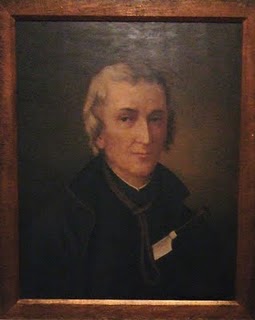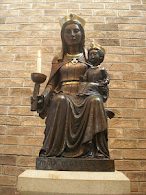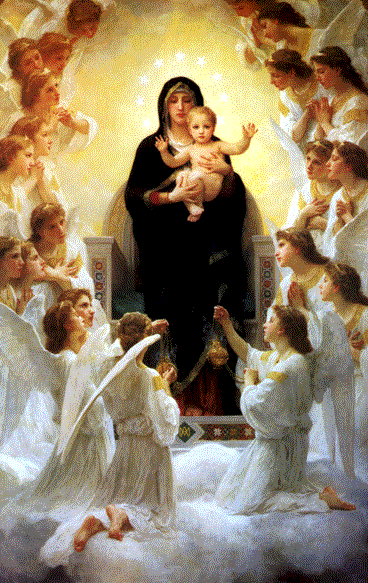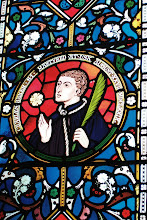
St David Lewis was a Welsh Jesuit priest who was born in Abergavenny in 1616 to a Catholic mother and a Protestant father. David, the youngest of nine children, was brought up as a Protestant although his eight siblings were brought up as Catholics. That could well have been for political and economic reasons. David’s father, Morgan Lewis, was headmaster of King Henry VIII Grammar School in Abergavenny and his Protestantism may have been genuine or it may have been for convenience. In his position, he would have been expected to conform to the new Religion. His son, David, attended the Grammar School and bringing him up as a Protestant would have added validity to Morgan’s claim to Protestantism. Whatever the reasoning behind it, David was indeed brought up as a Protestant. However, at about the age of nineteen, while on a visit to Paris, he converted to Catholicism. In 1638, David Lewis entered the English College in Rome and began studies for the Catholic priesthood. In July 1642, David was ordained and three years later he entered the Jesuit Novitiate at Sant’ Andrea, which had been founded by St Francis Borgia in 1565. Father David Lewis S J, was sent to Wales in 1647 but was soon recalled to Rome. In 1648, Fr Lewis returned to Wales and here he spent the remainder of his life working for the persecuted Catholics in Monmouthshire and the surrounding area.
Christmas of 1678 wasn’t exactly a joyful one for Fr David Lewis. Details of that Christmas are scant but we do know for certain that it was Fr Lewis’s last Christmas on earth. As he prepared to celebrate Mass on Sunday morning, 17th November, Fr Lewis was arrested at Llantarnam. He was incarcerated in Monmouth Gaol. The Justice of the Peace, John Arnold, who had feigned friendship with the priest, promised him that he would not allow him to be treated with “any incivility or severity”. The promise proved to be as false as the friendship! That very same day, the perfidious Arnold had ordered that a strict watch should be kept over the prisoner, who was guilty of “high treason”, i.e., he was a Catholic priest!
Christmas found Fr Lewis in Monmouth Gaol, where a friend of the Jesuit had paid 14/ a week to provide him with a good lower room, a bed, linen, fire and a candle. Officially, Fr Lewis was in Solitary Confinement but the Underkeeper of the Gaol allowed friends to visit him in his cell by day.
Early in December, the Lords ordered an investigation of the Jesuit College of St Francis Xavier at the Cwm, where Fr Lewis had been Superior. Just before Christmas, the Bishop of Hereford, Herbert Croft, led a raid on the Cwm. He had the enthusiastic help of John Arnold, John Scudamore and Charles Price. The buildings were ransacked and all books, papers and property confiscated. Some of the books stolen from the Cwm are today in the library of Hereford Cathedral. Croft reported that he had found “two horse- loads of books in an adjoining Pig Cot covered with straw, also a great store of divinity books (but they are not yet brought to me, it being Christmas holy days, but they remain in a safe hand) many whereof are written by the principal learned Jesuits,”
In the first week of December, Fr Philip Evans, the youngest of the Jesuit missioners in South Wales, was arrested. He was imprisoned in Cardiff Castle where he was kept in Solitary Confinement for three weeks. After this time, the Governor was persuaded to allow Fr Evans and a secular priest, Fr John Lloyd, who had been arrested in November, to share a cell. Other priests had been arrested and some had died of hardship and exposure. All these things Fr David Lewis would have learned from the friends who visited him in Monmouth Gaol.
On the Sunday morning of Christmas week, Fr Lewis was visited in his cell by several magistrates who questioned him about William Bedloe’s allegation that he had supplied information about the Marquis of Worcester’s Agent’s complicity in the Popish Plot. Father Lewis deposed that he had neither spoken to nor corresponded with the informer. He further deposed that he had never even heard of the Plot until it became common knowledge throughout the land. His deposition was sent to London, but no more was heard of it.
So passed what was to be the last Christmas of Fr David Lewis. Early in 1679, the new High Sheriff, James Herbert, decided to move the County Gaol from Monmouth to Usk. On 13th January, a bitterly cold and miserable day, Fr Lewis was transferred to Usk Gaol to await his fate. Later that year, in the lovely month of August, Fr David Lewis was martyred at Usk. He was canonised in 1970 by Pope Paul VI.
So passed what was to be the last Christmas of Fr David Lewis. Early in 1679, the new High Sheriff, James Herbert, decided to move the County Gaol from Monmouth to Usk. On 13th January, a bitterly cold and miserable day, Fr Lewis was transferred to Usk Gaol to await his fate. Later that year, in the lovely month of August, Fr David Lewis was martyred at Usk. He was canonised in 1970 by Pope Paul VI.








.JPG)

.JPG)





I need lessons like this to remind me that freedom to worship is not free, but bought and paid for by many before me. Thank you! Cathy
ReplyDeleteGood Morning Cathy
ReplyDeleteYou are right, we all need reminders of the real cost of our freedom! The martyrs were amazing people. I don't know how I would respond under such circumstances. I hope I would have enough courage, and with God's help, I would do the right thing. We really should cherish our faith and take every opportunity to show our appreciation of Holy Mass and of our priests. Perhaps we take these things too much for granted. Thanks for looking in. God bless you.
Merry Christmas to you and your family and a Peaceful New Year.
ReplyDeleteGod bless.
Thank you very much, Victor, and a very Merry Christmas to you and yours. May the New Year bring you many blessings. God bless you.
ReplyDelete